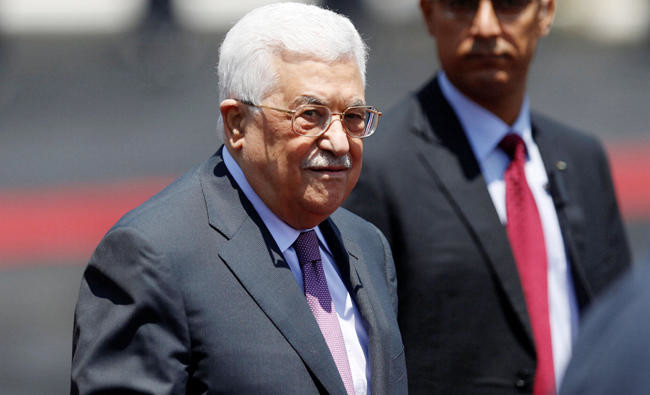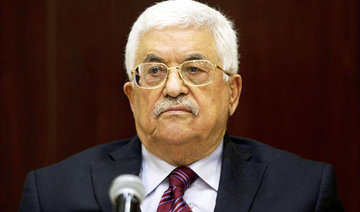AMMAN: The Palestine Liberation Organization (PLO) executive committee decided Saturday to intensify discussions aimed at reaching an agreement to hold a full session of the Palestine National Council (PNC) parliament-in-exile.
The decision follows a recommendation by the Fatah Central Committee to convene a full session of the PNC in order to elect a new executive committee and central council, and to approve a political program.
Hamadeh Faraneh, a member of the PNC, welcomed the call but expressed reservations about the idea of holding the meeting in Ramallah.
“The problems with holding the PNC in Ramallah are twofold,” Faraneh said. “It needs both a political consensus and a legal quorum.”
Political consensus would require national reconciliation, at least within the PLO factions. And in order to have a legal session, members would have to appear in person and not via video conferencing, Faraneh told Arab News. Some PNC members living outside of Palestine may refuse to come to occupied areas or may be barred by the Israelis from entering.
The question of holding the PNC outside of Ramallah could produce political problems with Palestinian President Mahmoud Abbas. Following the suspension of security coordination with Israel, Abbas is no longer as mobile as he was. And holding a PNC session in nearby Amman or Cairo might be seen as having political meanings or weakening the independence of the PLO.
One possibility, Faraneh suggests, is to hold the PNC session in Algiers. The 1988 session held in Algiers witnessed the declaration of the state of Palestine by Yasser Arafat.
PLO intensifies talks for Palestinian National Council session
PLO intensifies talks for Palestinian National Council session

Jordan hospital offers injured Gazans hope for recovery

- Israel’s 15-month offensive in Gaza left the coastal enclave a wasteland of rubble that will take years to rebuild
AMMAN: Karam Nawjaa, 17, was so badly injured when an Israeli strike hit his home in Gaza nearly a year ago that his own cousin, pulling him from the rubble, did not recognize him.
After rushing Karam to hospital he returned to continue searching for his cousin all night in the rubble.
In that strike on Feb. 14, 2024, Karam lost his mother, a sister and two brothers. As well as receiving serious burns to his face and body, he lost the ability to use his arms and hands.
Now, the burns are largely healed and he is slowly regaining the use of his limbs after months of treatment at a hospital run by Doctors Without Borders in the Jordanian capital Amman which operates a program of reconstructive surgery.
“I only remember that on that day, Feb. 14, there was a knock on our door ... I opened it, my brother came in, and after that ... (I remember) nothing,” he said.
“Before the war I was studying, and thank God, I was an outstanding student,” Karam said, adding that his dream had been to become a dentist. Now he does not think about the future.
“What happened, happened ... you feel that all your ambitions have been shattered, that what happened to you has destroyed you.”
Karam is one of many patients from Gaza being treated at Amman’s Specialized Hospital for Reconstructive Surgery, Al-Mowasah Hospital. He shares a room there with his younger sister and their father.
“All these patients are war victims ... with complex injuries, complex burns ... They need very long rehabilitation services, both surgical but also physical and mental,” said Moeen Mahmood Shaief, head of the MSF mission in Jordan.
“The stories around those patients are heartbreaking, a lot of them have lost their families” and require huge support to be reintegrated into normal life, he added.
Israel’s 15-month offensive in Gaza left the coastal enclave a wasteland of rubble that will take years to rebuild.
Displaced Palestinians have been returning to their mostly destroyed homes after a ceasefire came into effect on Jan. 19.
Syria’s leader Sharaa named president for transitional period, state news agency says

- The news cited commander Hassan Abdel Ghani
CAIRO: Syria’s de facto leader Ahmed Al-Sharaa was named as the country’s president for the transitional period, the Syrian state news agency reported on Wednesday, citing commander Hassan Abdel Ghani.
Jordan’s king meets Belgian monarch in Brussels

- Parties discuss recent developments in the Middle East
- King Abdullah expresses Jordan’s commitment to enhancing partnership with EU
LONDON: The King of Jordan Abdullah II met King Philippe of Belgium in Brussels on Wednesday, accompanied by Crown Prince Hussein.
The monarchs discussed recent developments in the Middle East and stressed their commitment to supporting efforts for peace and stability in the region, the Jordan News Agency reported.
King Abdullah spoke of Jordan’s commitment to enhancing its partnership with the EU during a meeting with top European officials, including Ursula von der Leyen, the president of the European Commission; Roberta Metsola, the president of the European Parliament; and European Council President Antonio Costa.
Jordan and the EU signed a strategic partnership on Wednesday in which the EU pledged €3 billion in financing and investments for Jordan.
In his meeting with EU officials, the Jordanian monarch affirmed his country’s commitment to the establishment of a Palestinian state in the Occupied Territories and warned of the escalation of action in the West Bank, the Jordan News Agency added.
He emphasized the importance of increasing the flow of humanitarian aid and maintaining the ceasefire agreement between Hamas and Israel, which ended the 15-month conflict in Gaza.
Lebanon official media reports Israeli strike in south

- “An enemy drone” carried out a strike targeting a house in Yohmor
BEIRUT: Lebanese official media said an Israeli strike hit south Lebanon on Wednesday, the second consecutive day to see such a raid despite a fragile ceasefire between Israel and Hezbollah.
“An enemy drone” carried out a strike targeting a house that “had been destroyed in a previous raid” in south Lebanon’s Yohmor Al-Shaqeef, the National News Agency said.
Israeli troops to remain in Jenin refugee camp, defense minister says

- Israel Katz: ‘Jenin refugee camp will not be what it was’
- Palestinian Authority condemns ‘provocative’ comments by Katz
JENIN, West Bank/JERUSALEM: Israeli troops will remain in the Palestinians’ Jenin refugee camp once the large-scale raid they launched last week is complete, Defense Minister Israel Katz said on Wednesday as a crackdown in the occupied West Bank extended into a second week.
Hundreds of Israeli troops backed by helicopters, drones and armored vehicles have been fighting sporadic gunbattles with Palestinian militants while carrying out searches in the streets and alleyways for weapons and equipment.
“The Jenin refugee camp will not be what it was,” Katz said during a visit to the refugee camp. “After the operation is completed, IDF forces will remain in the camp to ensure that terrorism does not return.”
He did not give details and a military spokesperson declined to comment.
The Palestinian foreign ministry condemned what it called Katz’s “provocative” statement and called for international pressure on Israel to stop the operation, which has already been condemned by countries including France and Jordan.
Israeli forces went into Jenin immediately after the start of a six-week ceasefire in Gaza, saying it aimed to hit militant groups including Hamas and Islamic Jihad, both of which receive support from Iran.
Israel regards the West Bank as one part of a multi-front war against Iranian-backed groups established around its borders, from Gaza to Lebanon and including the Houthis in Yemen, and it turned its attention to the area immediately after the halt to fighting in Gaza.
At least 17 Palestinians, including six members of armed militant groups and a two-year-old girl, have been killed in Jenin and the surrounding villages during the operation, according to Palestinian officials.
The military said forces had killed at least 18 militants and detained 60 wanted individuals, dismantling over 100 explosive devices and seizing a weapons manufacturing workshop.
An investigation into the death of the girl is still ongoing, a spokesperson said.
Within the camp, dozens of houses have been demolished and roads have been dug up by special armored bulldozers, driving thousands of people from their homes. Water has been cut and Palestinian officials say at least 80 percent of the camp’s inhabitants have been forced to leave their homes.
“It’s terrifying, the explosions the fires, the houses which were demolished,” said Intisar Amalka, a displaced camp resident who said her nephew’s car had been destroyed by an Israeli bulldozer.
The Jenin refugee camp, a crowded township built for descendants of Palestinians who fled their homes or were driven out in the 1948 Middle East war around the creation of the state of Israel, has been a center of militant activity for decades and the target of repeated raids by Israeli troops.
Just prior to the latest raid, security forces of the Palestinian Authority, which exercises limited governance in parts of the West Bank, conducted a weeks-long operation of its own in a bid to reassert control in Jenin.
As the fighting in Gaza has subsided, at least for the moment, Israeli forces have stepped up operations across the area, setting up checkpoints and roadblocks which have made traveling even short distances between towns and villages an hours-long trial for Palestinians.
Elsewhere in the northern West Bank, Israeli forces have been carrying out an operation in Tulkarm, another volatile city where they have clashed repeatedly with militants recently, moving into the city itself as well as into its refugee camp.
The West Bank, a kidney-shaped stretch of land about 100 kilometers (62 miles) long, was seized by Israel in the 1967 Middle East war and is seen by Palestinians as the core of a future independent state, along with Gaza.
It has seen a surge in violence since the start of the war in Gaza in which hundreds of Palestinians have been killed, many of them armed gunmen but also including stone-throwing youths or uninvolved civilians, and thousands have been arrested.
Palestinian attacks in the West Bank and Israel have also killed dozens of Israelis.




















